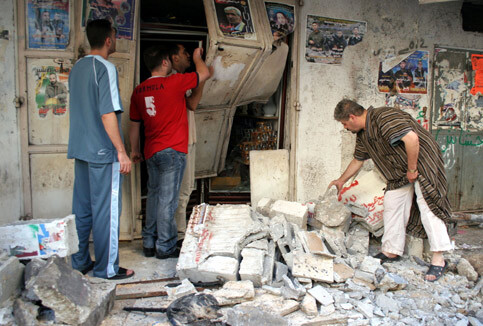United Nations News Service 28 September 2006

Palestinians inspecting the damage to their shops after an Israeli incursion in Balata refugee camp in the West Bank city of Nablus, 27 September 2006. (MaanImages/Rami Swidan)
United Nations High Commissioner for Human Rights Louise Arbour briefed the Human Rights Council today on the worldwide work of her Office, voicing concern at the deteriorating security situation in Afghanistan and announcing that she would soon visit Israel and the Occupied Palestinian Territories.
The situation in Afghanistan carries grave implications for human rights, Ms. Arbour told the new enhanced Council during its second session in Geneva, recalling that just this Monday armed assailants targeted and for the first time killed a female official, Safia Ama Jan, Director of the Women’s Affairs Department of Kandahar province.
Civilians have at times become indirect victims of attacks by insurgents as well as by Government and international military forces, she added.
Turning to the Palestinian Territories (OPT), she stressed that only a political solution “will bring an end to the loss of life, immense suffering and hardship.”
“But pending that, compliance by all duty bearers with their responsibilities under international humanitarian and human rights law is of the utmost importance,” she added, noting that her forthcoming visit will allow her to conduct a first-hand assessment of the situation.
Ms. Arbour’s appeal echoed a call for political action issued yesterday by the head of the principal UN agency tending to Palestinian refugees.
“The political front is where we need your leadership,” UN Relief and Works Agency (UNRWA) Commissioner General Karen Koning AbuZayd told UNRWA’s Advisory Commission in Amman, stressing that living conditions in Gaza, already in steep decline, had “deteriorated dramatically” with Israeli action after the kidnapping* of one of its soldiers in June.
“I see my role as one of informing political leaders of the facts on the ground and of encouraging action that will ease the plight of the refugees,” she added, expressing hope that a unity government in Palestine will become a reality and pave the way for revitalizing the peace process.
She noted food distribution in Gaza had been delayed because of severe difficulties getting goods through the Karni crossing from Israel and that civilian casualties had been “depressingly numerous” with 280 people killed, 45 of them children, and 815 injured.
Referring to the situation in the West Bank, Ms. AbuZayd stressed that the “insidious effects” of the barrier which Israel is building, while less visible, “are as devastating as what is so plain to see in Gaza.”
Commerce and travel in some areas have been reduced to a trickle. “Land expropriations and house demolitions continue, as does settlement expansion. IDF (Israeli Defence Forces) incursions and live fire incidents are a daily occurrence in the northern West Bank,” she added.
She noted that the once bustling downtown area of Hebron “is now surreally desolate of commerce, and presents a harrowing existence for those few Palestinians who dare to remain or who are too deep in poverty to move elsewhere. Settler violence has forced out over half the Palestinian population in some neighbourhoods in downtown Hebron,” she added.
“We are very concerned about the human impact of the closure regime - whether for those in Hebron, those caught in enclaves, those who lost livelihoods to the seam zone, those separated from families by the barrier or Bedouins whose traditional way of life is destroyed.”
Editor’s Note: The dictionary definition of the word “kidnap” necessitates that the abduction of a person is illegal. As the Israeli soldier was part of an occupying force, captured during a military raid against a military target, in international law he is considered to be a “prisoner of war”, not a kidnap victim. The rules governing the treatment of prisoners of war are spelled out in the third Geneva Convention of 1949, article 13 of which requires that POWs “must at all times be treated humanely”.